Cape Winelands Travel Guide
The verdant beauty of the Winelands is one of the Cape's most alluring attractions, and no visit to the region would be complete without exploring its wine routes. Visitors will find rugged, blue-tinged mountains surrounding green valleys, and charming, historic towns among vineyards and olive groves. Culture lovers can admire traditional Cape Dutch architecture, sip world-class wines and soak up the rich heritage.
Stellenbosch, Franschhoek and Paarl are the most well-known wine-producing valleys in the region, and are situated within easy reach of each other. Groot Constantia is the oldest wine farm in South Africa and is located within the Mother City itself. Worcester, Tulbagh, Wellington, and Somerset West are some of the region's smaller wine routes.
What's more, travellers can pair their wines with food from some of the country's finest restaurants, browse art galleries and craft shops, visit historic monuments and museums, and enjoy activities such as hiking, horse riding, fly fishing, golf, and paragliding. Food and wine festivals take place throughout the year and are a great introduction to the bewitching charms of the region.
Things to do in Cape Winelands
The Cape Winelands are vast and travellers should plan their visits properly. The main wine route areas are Stellenbosch, Paarl and Wellington, and Franschhoek. Somerset West is also a great wine-making region. Visitors can't go wrong with any of these options, which all feature quaint old towns as well as beautiful scenery and famously good wines.
In Stellenbosch, favourite estates include Spier, Meerlust, Simonsig, Waterford, Rust en Vrede (1694), and Rustenberg (1682). Paarl and Wellington highlights include Fairview, Laborie, Doolhof, and Diemersfontein. In Franschhoek, La Motte is a treat, while in Somerset West, Vergelegen and Morgenster are genuinely special.
Cape Town's City Sightseeing tourist buses offer a hop-on, hop-off wine-tasting route, though serious wine enthusiasts should consider purchasing a guide prior to exploring the winelands. They could prove immensely useful, with many documenting all the wines of the South African industry and providing some background and maps for each estate.
Most of the famous estates are open on weekends, but some of the smaller ones are only open during the week. For this reason, it is best to plan a wine route for a week day if possible.
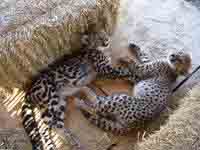
Spier Wine Estate
Spier is one of South Africa's most famous and most popular wine estates. Internationally renowned as cultural resort, it offers luxurious accommodation, conference facilities, shopping, fine dining, and a variety of recreational activities, including golf, horse riding, picnics, and a cheetah park. Travellers can visit Eagle Encounters, where they can get up close to some amazing birds of prey. An outdoor amphitheatre traditionally presents a variety of music, theatre, and dance during the Spier Summer Arts Season, seeking to promote, showcase and develop emerging South African talent. Situated in the heart of the Stellenbosch winelands region, Spier also boasts world-class wines in what is the oldest working cellar in South Africa.
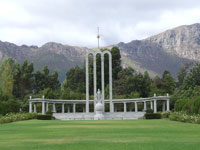
Huguenot Monument and Museum
The historic Huguenot Monument was erected in 1945 and is a major tourist attraction in the Franschhoek Valley. It commemorates and honours the French Huguenots who arrived in South Africa in 1688 after fleeing brutal persecution in their home country. The nearby museum documents the history of the settlers, from their flight from France to their arrival and successful establishment of the Franschhoek wine region in the Cape of Good Hope. The little museum contains a variety of Bibles, documents, furniture, utensils, and artefacts, providing insight into the life of the Huguenots in the Cape. The memorial is graceful and the calm of the place is moving, considering the violent history of the fleeing Huguenots.
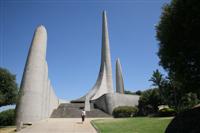
Afrikaans Monument and Museum
The Afrikaans Language Museum pays tribute to a unique language that is little more than 300 years old. Created from the melting pot of languages in the Cape, Afrikaans developed from the need of Dutch settlers, French Huguenots, slaves from Malaysia, Indonesia, Madagascar, and West Africa, and the local Khoi people to communicate. The struggle to gain recognition of Afrikaans as an official language was carried out from Paarl, and the museum commemorates the people that played an important role in the process. The institution also explores the language in its diversity.
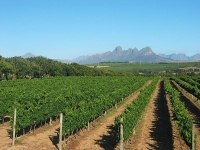
Stellenbosch
At the heart of the wine industry is the pretty town of Stellenbosch. Along with being the second oldest town in South Africa, it is regarded as the country's wine capital, with over 110 cellars in the area. The Stellenbosch vineyards were established by the Dutch governor of the Cape, Simon van der Stel. He arrived in 1679 and noted that the combination of rich soil and ideal climate were perfect for viticulture. In 1971 the first wine route in South Africa was opened, and today the Stellenbosch wine route is perhaps the best known and finest that the country has to offer. It produces award-winning wines from estates such as Morgenhof, Kanonkop, Warwick, and Zewenwacht.
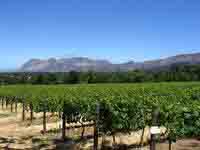
Constantia
Constantia is the origin of wine production in South Africa, and one of Cape Town's most exclusive suburbs. The Constantia wine route is the oldest yet smallest wine route in the Cape, consisting of just 10 wine farms that concentrate on producing a few wines of international quality and repute. The historic Cape Dutch homestead at Groot Constantia is one of the oldest wine estates in South Africa, home to the first governor of the Cape, Simon van der Stel, and the valley's most famous wine farm. The house itself is furnished with items from the period, while an adjacent wine museum exhibits drinking and storage vessels dating from 500 BC to the 19th century. There are some great restaurants and tasting rooms at Groot Constantia.
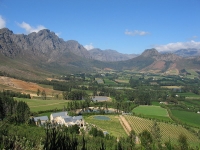
Franschhoek
Fleeing religious persecution in France in the 1700s, more than 200 French Huguenots arrived in the Cape and were settled in the valley that soon became known as Franschhoek (French Corner), which is today situated in the heart of the Cape Winelands region. Many of the settlers were experienced wine producers and they soon recognised the potential of the region for wine and fruit production, establishing wine estates throughout the spectacular Franschhoek Valley in surroundings of magnificent scenery and towering mountains. Today the town is famous not only for its splendid wines and beautiful vistas, but also as the gourmet capital of South Africa, boasting the highest number of award-winning eateries in the country.
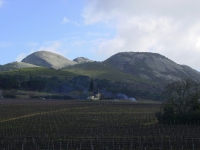
Paarl
Paarl is built in the picturesque Berg River Valley, which lies at the foot of the second-largest granite outcrop in the world. It is the biggest town in the Cape Winelands and the third oldest European settlement in South Africa. Paarl features some of the most superb examples of Cape Dutch, Victorian, Edwardian, and Art Deco architecture in the country. Its rich history includes Drakenstein Prison, where the iconic anti-apartheid activist and former president of South Africa, Nelson Mandela, spent his last years in captivity. The Language Monument overlooks the town from the slopes of the Paarl Mountain, and symbolises the birth of the Afrikaans language. Along with its historical background, Paarl is also known for its award-winning wines, particularly its reds, which can be sampled along one of the world's first 'Red Routes'.
Cape Winelands Climate and Weather
The Cape experiences a Mediterranean, sub-tropical climate with hot and generally dry summers (December to February), and cold and wet winters (June to August). Winter experiences heavy rains, strong northwesterly winds and low temperatures, though the season doesn't preclude wine-tasting. Many of the indoor venues are warm and cosy during the cold months, and the occasional mountain snow only makes the scenery more picturesque.
The summer months are characterised by warm, dry days with little wind in the Cape Winelands. The daily temperature in towns such as Paarl and Stellenbosch can soar up to 100F (38C) during the hottest months between January and March so it is a good idea to pack sunscreen and hats if exploring in summer.
The Cape Winelands are wonderful to explore at any time of year, but the best time to enjoy the region is between the months of October and February, when it is hot and sunny and the beautiful estates ripen and bloom. Many locals recommend spring (October and November) and early autumn (March and April), as they're often sunny but cooler and more pleasant than the heat of summer. The winter months provide a cosier alternative.
South Africa travel info
Electricity
The electrical current is 230 volts, 50Hz. Round, three-pin plugs and round, two-pin plugs are standard.
Language
South Africa has 11 official languages, including Afrikaans, English, Xhosa, Zulu, and Sotho. English is widely spoken.
Money
South Africa's currency is the Rand (ZAR), which is divided into 100 cents. Money can be exchanged at banks, bureaux de change, and the larger hotels. ATMs are widely available and major international credit cards are widely accepted. Visitors should be vigilant when drawing cash from ATMs, as con artists are known to operate there. All commercial banks will exchange foreign currency. hello
Tipping
Tips of at least 10 percent are expected for good service if a service charge is not included in the bill. Tipping for services rendered is widely anticipated by porters, taxi drivers and petrol attendants. Golf caddies should be tipped accordingly. 'Car guards' operate in the city centres and tourist spots and will offer to look after parked cars; they are usually immigrants from neighbouring countries looking for work and will expect anything from ZAR 8 upwards on the driver's return, depending on how long the driver will have been away.
Health
Travellers from areas infected by yellow fever must carry a vaccination certificate; otherwise no vaccinations are required. There is a malaria risk in the low-lying areas of the Northern Province and Mpumalanga (including the Kruger National Park), as well as northeastern KwaZulu-Natal, and precautions are advised when travelling to these areas, especially between October and May. Vaccinations are recommended for hepatitis A, hepatitis B and typhoid. Tap water is generally safe in urban areas but sterilisation is advisable elsewhere. Medical facilities in South Africa are good in urban areas, but medical insurance is strongly advised as private hospitals expect cash up front and public hospitals are best avoided. Medication is readily available in major cities, but those travelling outside of these centres for an extended period should bring a basic supply kit for emergency self-treatment.
Safety
It is worthwhile noting that the South African authorities give high priority to the protection of tourists and that, although crime rates are high, popular tourist sites and the main hotel areas tend to be safe. Still, travellers should remember that violent crime tends to be concentrated in pockets throughout the country and travellers should do some research to find out which areas to avoid. For instance, Berea and Hillbrow in Johannesburg are high-risk areas, and township areas in general are dangerous for foreigners.
There is a risk of petty, opportunistic crime in all urban areas and armed robberies are fairly common in Johannesburg. Travellers should always be aware of these risks and exercise the necessary precautions. Carjackings and smash-and-grab robberies are common in major cities. Doors should be locked when driving; bags and valuables should be kept out of sight. Travellers should not walk alone at night in any area, and should be vigilant when using ATMs. They should not display signs of wealth (mobile phones, money, expensive jewellery, cameras) on the streets. Credit card fraud is on the increase, meaning travellers should be vigilant and never allow their card out of their sight.
Nationwide power cuts (loadshedding) take place regularly, occurring many times a day for multiple-hour stretches. There is some risk that outages might interfere with telecommunications and security systems, hotels and other accommodations, as well as public lighting and traffic lights. Visitors can plan for power cuts by asking their accommodation provider how they mitigate loadshedding, and by checking planned power outages on the Eskom website or loadshedding apps. They can also carry a power bank with extra charging cables for electronic devices they need, and pack portable lighting such as torches.
Local customs
South African culture and etiquette in urban areas is very Western. While standards of dress vary, beachwear should generally not to be worn off the beach, and nude sunbathing is only permissible in a few designated areas. Homosexuality is legal and accepted in urban areas without much fuss, but is frowned on by some conservative South Africans and can be a problem in township areas. Although locals may complain loudly about the country and government, they will take offense if a foreigner is critical. Racism is a sensitive issue; however, interracial relationships are now common and widely accepted. South African racial terminology differs from what is acceptable in North America. The terms 'black' and 'white' are appropriate for those of African and Caucasian descent, respectively. 'Coloured' refers not to black Africans, but those of mixed African and European descent and is not considered an offensive term. South Africans are friendly and hospitable, and will often go out of their way to assist tourists who need help.
Doing business
Business practices in South Africa are influenced by South Africa's range of ethnicities, languages and even geographical areas, but in general follow common patterns. When doing business in South Africa it's important to be culturally sensitive and as understanding of colleagues' historical context as possible. Most South Africans prefer to do business with contacts they've met before, but they are also warm and open to newcomers. Working to build and maintain business relationships is vitally important in the South African business environment. South Africans are renowned for their friendliness, which generally supersedes business formality.
Most large corporations, as well as the banking and financial sector, still adopt relatively formal business practices, whereas other companies and work environments enjoy more relaxed and personable atmospheres. Clear management hierarchies and respect for senior executives and colleagues are of paramount importance. However, business exchanges and decision-making processes often take on an egalitarian aspect. As with most countries, punctuality is highly regarded, though government officials are notorious for their tardiness when it comes to keeping time. Dress codes tend to be conservative, but not overly formal. Suits are the exception more than the rule, but dressing stylishly will always count in a visitor's favour. It's best to dress formally for initial meetings.
South Africans value hard work and respect those who succeed, but are mindful of other aspects of life such as healthy living, family and nurturing relationships, all of which add up to a well-balanced life. Generally South Africans are regarded as relaxed and informal with regards to introductions and the handling of business cards. Shaking hands is common for both men and women. The giving of gifts is uncommon and unnecessary.
The official language of business in South Africa is English, and business hours tend to start at 8:30am or 9am and the day comes to a close at 5pm, or later in the major urban centres. Working over weekends tends to be quite rare in South Africa.
Duty free
Travellers to South Africa do not have to pay duty on 200 cigarettes, 20 cigars and 250g of tobacco; 2 litres wine and 1 litre spirits; perfume up to 50ml and 250ml eau de toilette; and other goods to the value of ZAR 5,000 per person.
Communications
The international access code for South Africa is +27. Mobile phone networks are available across the country, and there are roaming agreements with most international mobile operators. Mobile service providers offer very cheap 'pay-as-you-go' SIM cards, which are a good option for visitors staying for some time. Alternatively, travellers can use eSIMs if their cellular providers support it on their networks. WiFi is easily available, especially in the larger cities.
Passport & Visa
Passports should be valid for at least 30 days beyond the period of intended stay. An onward or return ticket is required, as is evidence of sufficient funds. Extension of stay for an additional 90 days is possible if travellers apply at least 60 days prior to the expiry date of their visa, permit or visa exempt period. There are special requirements for travelling to South Africa with children under the age of 18, and different requirements for unaccompanied children entering the country. Travellers should consult the nearest South African high commission or embassy for details. It is highly recommended that travellers' passport have at least six months' validity remaining after the intended date of departure from their travel destination. Immigration officials often apply different rules to those stated by travel agents and official sources.
Entry requirements
United States nationals need a passport valid for at least 30 days beyond intended travel. A visa is not required for stays of 90 days.
UK nationals need a passport valid for 30 days beyond the date of intended travel, but no visa is needed for stays of up to 90 days.
Canadian nationals need a passport valid for 30 days beyond the date of intended travel, but no visa is needed for stays of up to 90 days.
Australian nationals need a passport valid for 30 days beyond the date of intended travel, but no visa is needed for stays of up to 90 days.
Irish nationals require a passport valid for 30 days beyond intended travel, but no visa is needed for stays of up to 90 days.
New Zealand nationals require a passport valid for 30 days beyond intended travel. A visa is not required for stays of up to 90 days.
Useful contacts
South African Tourism, Johannesburg: www.southafrica.net
Emergencies: 10111 (Police), 10177 (Ambulance), 10112 (cellphone emergency number).Embassies / consulates in other countries
South African Embassy, Washington, United States: +1 202 232 4400.
South African High Commission, London, United Kingdom: +44 20 7451 7299.
South African High Commission, Ottawa, Canada: +1 613 744 0330.
South African High Commission, Canberra, Australia (also responsible for New Zealand): +61 2 6272 7300.
South African Embassy, Dublin, Ireland: +353 1 661 5553.
Embassies / consulates in South Africa
United States Embassy, Pretoria: +27 12 431 4000.
British High Commission, Pretoria: +27 12 421 7500.
Canadian High Commission, Pretoria: +27 12 422 3000.
Australian High Commission, Pretoria: +27 12 423 6000.
Irish Embassy, Pretoria: +27 12 452 1000.
New Zealand High Commission, Pretoria: +27 12 435 9000.



